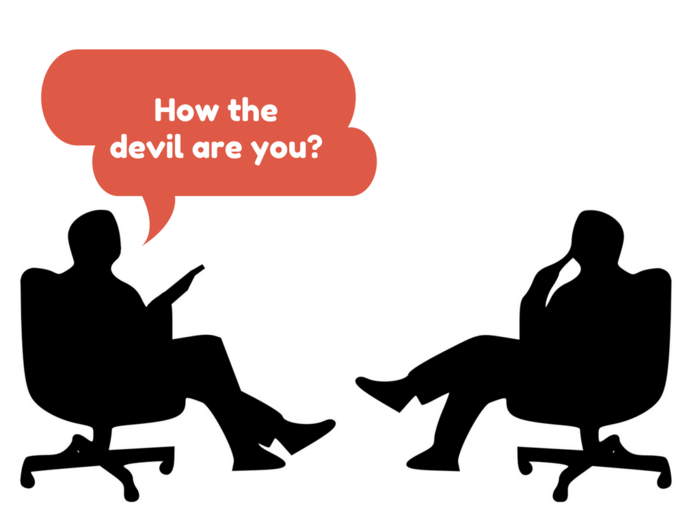Start studying Spanish anywhere – with an app, book or in a classroom – and the first thing you’ll ever look at is how to greet people and to introduce yourself.
In your Spanish-speaking career, you will no doubt find yourself using the most traditional phrases (like hola, ¿cómo estás?) a near infinite number of times. But don’t let yourself be fooled into thinking that these will be enough on their own to get good conversations going.
The only other sort of small talk expressions that most courses cover – stuff like how old you are, what your name is, where you’re from and what your profession is – might help you out of a jam in the first conversation with a new person. Meet the same person again and you can hardly cover this same ground again.
Some language magic is required to avoid you from quickly reaching conversational dead ends in your everyday interactions. The problem is that these phrases are precisely the kind of thing missing from your normal language courses.
Kick starting conversation
If you’ve already started practicing your Spanish in real life situations the above will all no doubt sound familiar. For those of you who are still studying in private, a quick thought experiment should suffice to illustrate the potential shortfalls we’re talking about.
Imagine that, in your home town, you run into an acquaintance in the street. How likely is it, in this situation, that you’ll say merely “hello, how are you?” and then sit back and wait for a full-blown conversation to magically emerge in front of you?
Not very.
Conversations need a bit of care and attention to blossom into full small talk (and to avoid those painfully awkward silences). A few questions along the lines of “what have you been up to?”, “how’s things going?” or “how has life been treating you?” usually do the trick of getting your neighbour, work colleague or whoever to open up and start talking.
The same is true of small talk conversations in Spanish which generally feature a few staple expressions and phrases that are inexplicably omitted from most courses.
Study up on the following and prepare to become a don of small talk:
¿Qué has hecho?
Without doubt, the most useful phrase for this purpose – ¿Qué has hecho? is the Spanish version of our “What have you been up to?”. (Literally, it translates as “what have you done?”, but doesn’t carry the same kind of accusing tone that the English version does).
Unlike merely asking someone how they are – a question that can be thoughtlessly swatted away with a one-word answer – asking what someone has been up to generally provokes a fuller response.
¿Cómo te trata la vida?
The Spanish equivalent of “how has life been treating you?”, which also works well as a good way to get any friendly type conversation going.
There are plenty of other ways to say basically the same thing, giving you ample opportunities to mix things up a bit. Try out a few of these others for size: ¿Cómo va todo? (“How’s everything going?”); ¿Que hay (de nuevo)?; and ¿Cómo van las cosas?; (“How are things?”).
¿Cómo te fue…?
Another small talk classic that works as the a locals’ version of “How did you get on in….?” or “how was the…?”. Let’s look at a couple of examples of how to use this, so you know what we’re on about:
In the first scenario you run into a classmate in the cafeteria at university after both coming out of an end of term text. After trading greetings, you then ask them:
volume_mute¿Cómo te fue en el examen?
Meaning: “how did you do in the exam?” / “how did you get on in the exam?”.
Later, you see a friend on the street who you know was extremely excited about a hot date he had lined up for the previous night. You ask him:
¿Cómo te fue en la cita anoche?volume_mute
The Spanish way to ask: “How did the date go last night?”.
A small side note here. To ask about activities involving a whole bunch of people (for example, a group trip), you’ll need to replace the te with les or, in Spain, os e.g. ¿cómo les fue en el viaje? (“How was the trip?”).
¿Estás contento/a con…?
Estar contento/a, or “to be contented”, is the phrase which best fits if you want to ask someone if they’re happy in their job, car, relationship, life etc.
It’s heard much more often in small talk situations than is estar feliz; the phrase which us language learners most often think of as the closest equivalent of “to be happy”.
Want to get some conversation started by asking a friend if she is happy in her new job? Then do so using the following phrase: ¿Estás contenta con el nuevo trabajo?.
Know that they’ve just moved? Then how about asking ¿Estás contenta con la nueva casa?.
Got any questions about the Spanish equivalents of your favourite English small talk expressions? Ask us below and our team will reveal all…

